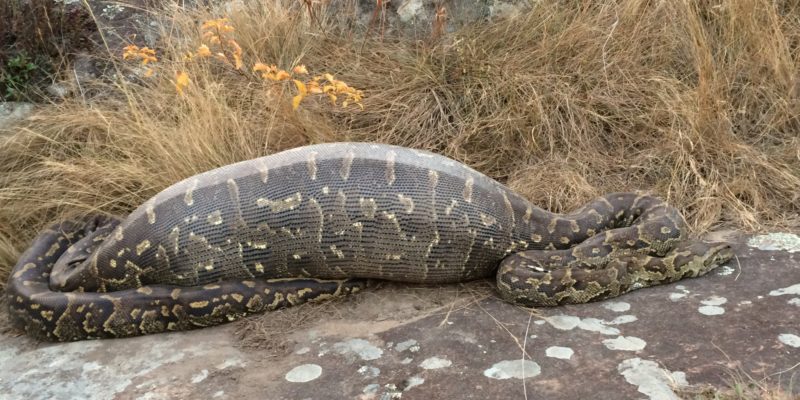Three new reports published on Monday by the Python Conservation Partnership (PCP), a partnership between Kering, the International Trade Centre (ITC) and the Boa and Python Specialist Group of the International Union for Conservation of Nature (IUCN), reveal that the wild harvesting and farming of pythons is ecologically sustainable and results in socioeconomic benefits for poor households in South-East Asia.

Initially presented on Monday at the Conference of the Parties to CITES (CoP17) in Johannesburg, South Africa, the “Sustainable Management of the Trade in Reticulated Python Skins in Indonesia and Malaysia“, “Trade in Python Skins: Impact on Livelihoods in Viet Nam” and “Trade in Python Skins: Impact on Livelihoods in Malaysia” reports represent the culmination of three years of scientific research and signify the completion of the research phase of the PCP.
The PCP has reportedly undertaken research projects since its creation in 2013 to measure the socio-economic benefits of the trade in python skins in South-East Asia, as well as the sustainability of wild harvesting and the economic viability of python farming. The PCP has also supported training for those engaged in the trade and has tested methods to verify the source of pythons and improve the traceability of skins. Following the partnership’s first report published in 2014, on the feasibility of farming pythons – “Assessment of Python Breeding Farms Supplying the International High-end Leather Industry” – the peer-reviewed reports published today reveal the importance of the trade for the livelihoods of people in Malaysia and Viet Nam and offer detailed recommendations to improve the monitoring and management of the trade overall. Key findings include:
- Wild harvest of pythons is ecologically sustainable in Sumatra, Indonesia;
- Management of the trade through size limits, ongoing monitoring of harvested snakes and capacity development of key actors will contribute to sustainable trade; and
- In both wild harvest and captive farming in Malaysia and Viet Nam, the trade improves livelihood resilience by giving poor households the opportunity to increase and diversify income.
In addition to these reports, the PCP has developed technical documents to be published later this year on using novel techniques to verify the provenance of python skins. The PCP will also release guidance on best practices for animal welfare and management in python farms and processing facilities. These guidelines will initially be implemented and tested in Kering’s supply chain to help refine them. In 2017, the PCP will enter into a new phase, opening up the partnership to a broader group of stakeholders in the python trade, with the goal of implementing positive and durable change in the industry.
“The PCP is an excellent example of new and multi-disciplinary collaborative models driving real, positive change towards sustainability,” said Marie-Claire Daveu, Chief Sustainability Officer and Head of International Institutional Affairs at Kering. “Information and transparency in the python trade was lacking and we all required more guidance to ensure a robust and sustainable trade. After 3 years of research we are very pleased to open-source the results of this important new research with ITC and IUCN. We are confident that this will improve the trade and Kering is proud to support the expert recommendations in our supply chains.”
“These studies demonstrate that trade in biodiversity is a credible strategy for achieving the Sustainable Development Goals,” said ITC Executive Director Arancha González. “ITC will continue to work with IUCN and the fashion industry to find innovative ways to promote the sustainable use of flora and fauna and to improve the livelihoods of the world’s poorest people.”
“It is extremely encouraging to see the extraordinary progress made by Kering, the International Trade Centre and IUCN – three organisations with different visions, working collaboratively to achieve a common goal,” said Tomás Waller, Chair of the IUCN/SSC Boa and Python Specialist Group. “The results of the Python Conservation Partnership’s research and successful collaboration show that it is indeed possible to enhance sustainable use of pythons while at the same time providing livelihood benefits for local communities participating in the trade.”
“We welcome this work showing the benefits of python skin trade to rural communities, as well as the depth of engagement with the private sector in making sure that the global value chain is put onto a better and more sustainable footing,” said John E. Scanlon, Secretary-General Convention on International Trade in Endangered Species of Wild Fauna and Flora (CITES). “This work will benefit both the species and the rural communities. We hope more private sector entities join initiatives such as those being pioneered here by the PCP.”
To download the reports click here: “Sustainable Management of the Trade in Reticulated Python Skins in Indonesia and Malaysia“, “Trade in Python Skins: Impact on Livelihoods in Viet Nam” and “Trade in Python Skins: Impact on Livelihoods in Malaysia”
